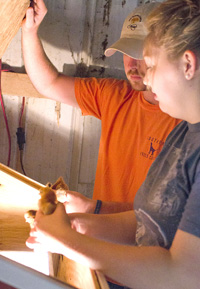SWU professor ‘hatches’ a plan to make learning more experiential
CENTRAL — In the two years that professor Staci Johnson has taught animal science at Southern Wesleyan University, her students have visited a lot of farms, but there are limits to what they can do with someone else’s animals; at the same time, veterinary schools are big on animal handling experience.
“We want to be able to fulfill the prerequisites for vet school,” said Johnson, who now sees more students are becoming interested in entering veterinary medicine. “Almost all veterinary schools in the United States require an introductory course in animal science.”
Growing up on a farm, Johnson learned early in life about the role of farmers in caring for the welfare of their livestock. Seeking to facilitate hands-on animal handling experience, she explored her options and found that chickens would be a practical, cost-effective animal that could be housed in a small lab on the university’s Central campus.
She found an existing outbuilding on campus well-suited for housing a coop and a small chicken house. Working from plans she found online, Johnson enlisted the help of her husband Eric and her students to build the coop and small chicken house.
Student Amanda Molloseau commented that it’s nice being able to care for an animal that can’t yet take care of itself, adding that it brings out a “mommy” instinct in her.

“You have to make sure they’re fed, watered, change their paper. When they’re starting to lose their fluff, you have to make sure they’re not too cold or hot; you have to adjust the temperature. It’s just like taking care of little babies,” Molloseau said.
“I didn’t grow up on a farm but I’ve kind of been around chickens and horses,” said student Corey Cromer, adding that he’s beginning to learn how to handle them with care and feed and water them.
Although many of her students won’t enter veterinary medicine, Johnson sees practical benefits to the livestock lab.
Southern Wesleyan University students Amanda Molloseau and Corey Cromer check on nine baby chicks at the new livestock lab on the school’s Central campus. Students enrolled in Southern Wesleyan’s animal science course are beginning to benefit from the experience of handling and nurturing the chicks. Molloseau is a junior from Liberty majoring in biology, and Cromer is a senior from Central majoring in business management.
“Because chickens grow so fast — animal science is a practical biology — you get every aspect of biology within animal science; you get everything from anatomy and physiology to nutrition; you have to know about health and genetics — all those things together really encompass a whole lot of the biology classes we teach here but on a practical side,” Johnson said.
Just two days into the livestock lab project, Johnson’s students are becoming more actively involved in the learning experience.
“When we were finishing the building phase, one of the students said ‘I think we need to dig down. I’ve been reading online that some predators will burrow under the fence.’ They did it,” Johnson noted. They also began doing online research about baby chickens.
“They are taking responsibility for learning and they are applying it to a real-world problem. That’s what we try to do in all of our labs. I think they don’t even realize that I’ve snookered them into learning,” Johnson said.
After a few months, the young chickens will be sold in pairs to anyone in the surrounding community who would like them. Nearby Clemson University, where the chicks were hatched, will help market the roosters to interested buyers.
Johnson also noted that the enclosure they built could potentially be used for other small livestock in the future.



























